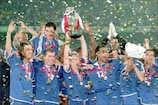Zidane basks in his golden summer of 2000
Monday, March 5, 2012
Article summary
France's 1998 FIFA World Cup win saw Zinédine Zidane's image being projected onto the Arc de Triomphe, but according to the man himself, he was at his peak in UEFA EURO 2000.
Article top media content

Article body
On 12 July 1998, an iconic figure was born. Moments after scoring twice against Brazil to propel France to FIFA World Cup glory, Zinédine Zidane's face was projected onto the front of Paris's Arc de Triomphe, the mercurial No10 looking down god-like at the wild celebrations taking place on the Champs Elysées.
This modest, unassuming and brilliant footballer of Algerian descent would become a symbol of success in modern-day multicultural France and a hero for the people. At 26, the Marseille-born schemer was already special and his match-winning performance against Brazil rightly went down in football folklore. Yet if truth be told his overall contribution to the tournament was sporadic, and he missed two games through suspension after being sent off in the second match against Saudi Arabia.
It was a different story two years later. In Belgium and the Netherlands, Zidane dominated a major championship in a way no individual had managed since Diego Maradona in 1986. From the opening game against Denmark to the final against Italy, 'Zizou' shone brightly, casting a spell on his opponents with clever flicks, mesmerising stepovers, slaloming runs and masterful vision. "I had faith in myself," he recalls. "I'd say 2000 was one of the best years of my career. Everything I did, I did well."
France's class of 2000 bristled with ability as youngsters such as Thierry Henry, Patrick Vieira and Nicolas Anelka dovetailed wonderfully with the experienced Marcel Desailly, Laurent Blanc and Didier Deschamps. But victory would almost certainly have been beyond them without Zidane's immense contribution. "We felt really confident, but for me the EURO is even harder to win than the World Cup," he explains. "There are only big teams. At a World Cup you have time to get going, but here you can't afford to make even a single mistake."
Zidane's apprehension must have deepened after the draw pooled France with Denmark, the Czech Republic and the Netherlands. "It was a really hard group," he says, "but I think that was a good thing. It meant we could get down to business straight away." That is exactly what France did, brushing Denmark aside 3-0 before defeating the Czechs 2-1. "We outclassed Denmark if I remember correctly. We were looking really good and Thierry Henry was excellent. So we made our mark straight away."
After being rested for the last group match against the Netherlands – which France lost 3-2 – Zidane produced his best display yet against Spain in the quarter-finals. "As far as I'm concerned, this was when the competition truly started," says Zidane, whose sublime free-kick broke the deadlock on 32 minutes. "The group games were hard but we'd never been tested like we were against Spain." After Gaizka Mendieta had levelled from the spot, Youri Djorkaeff netted a brilliant winner. "From that moment we felt we could do something really great."
The semi-final match-up certainly evoked greatness. A fervent Olympique de Marseille fan, Zidane was a spectator at the club's home, Stade Vélodrome, when Michel Platini fired France to victory in the EURO '84 semi-final against Portugal. The experience left a deep impression – not least because the game took place on his 12th birthday – and the memories came flooding back in the build-up to kick-off against the Portuguese in Brussels 16 years later.
"Before games I'd always leave the dressing room and spend a bit of time on my own with the ball," Zidane says. "That's when it started coming back to me and I thought, 'Wow, 16 years ago I was at the Vélodrome watching France beat Portugal. Now I've got the chance to do what they did.'"
Zidane filled the Platini role to perfection. He was virtually unplayable at the Stade Roi Baudouin in Brussels, effortlessly jinking in out and of challenges and launching attack after attack. Zidane was at the peak of his powers. Les Bleus conceded early to Nuno Gomes, yet Henry equalised before the pivotal moment arrived three minutes before the end of extra time: Sylvain Wiltord's shot struck Abel Xavier's arm and a penalty was awarded.
As the Portuguese protests delayed the spot kick, the tension became almost unbearable. One man, however, remained entirely calm. "There was a bit of time between the handball and the penalty," Zidane remembers. "It gave me the chance to get my breath back and compose myself. I knew if I scored we were through to the final [because of the golden goal rule]. I didn't question myself. I knew what I wanted to do, and I did it." His effort whizzed into the top corner.
France fell behind again in the Rotterdam final, Marco Delvecchio handing Italy a 55th-minute lead. Zidane recalls "chasing the game for a long time", but he had little doubt France would prevail once Sylvain Wiltord had struck in the fourth minute of added time. "We told ourselves if we equalised we'd win. In extra time there'd be only one team on the pitch. That was the case." David Trezeguet duly provided the coup de grace.
Unlike in 1998 and 2006, Zidane did not score in this showpiece. But the mark left by this footballing genius on the competition as a whole will never be forgotten.
This is an abridged version of an article that appears in the UEFA EURO 2012 Official Preview Guide. Click to purchase.






